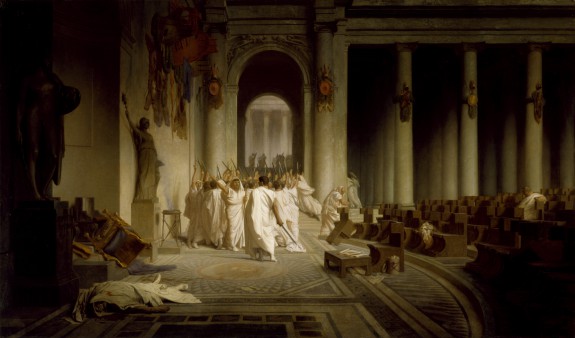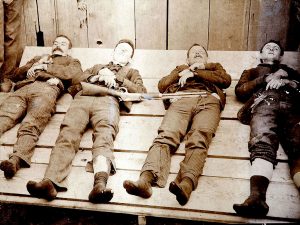Twenty three stab wounds was all it took to take down one of the most powerful leaders in Roman history. Despite being hailed as a powerful war hero in history, Julius Caesar was murdered in his own city by his own people on the Ides of March 44 B.C.E.1 Gaius Julius Caesar was born on July 13, 100 B.C.E. in Rome, and became dictator of the Roman Republic in October 49 B.C.E. The powerful image of Caesar even today cannot be compared, and that is why his legacy is still alive today. He was an ambitious figure that conquered modern day France, led the civil war, and influenced the fall of the Roman Republic. The Roman Republic before its fall served the wealthy and the privileged.2 Caesar did not want to do away with the Republic despite what critics say; all he wanted to do was reform it and give more power to the people. Members in the Senate, however, would not allow this. Julius Caesar’s assassination cannot be justified; it was treason and murder, even though those who murdered him defended their actions as tyrannicide.

The conspirators were not from outside forces of Rome; instead, they were from Caesar’s inner circle of elite senators. Caesar entrusted Brutus and Cassius to be his eyes and ears in the Senate, but they did just the opposite. Brutus, who was pardoned by Caesar after helping Caesar’s foe Pompey during the recent civil war, was one of the masterminds behind the assassination. In 44, Caesar appointed Brutus as proprietor of Gaul, or modern day France, which was one of the highest offices a nobleman could hold.3 Cassius, another conspirator who had been pardoned by Caesar at the beginning of his dictatorship, was also one of the masterminds behind the assassination. Repeatedly, Caesar seems to have contributed to his own death by pardoning those who did not deserve to be pardoned. Instead of dealing harshly with his enemies, he pardoned them and kept them close. He took the saying keep your enemies close to an extreme, since they ended up close enough to assassinate him.
In some ways, the conspirators who plotted against Caesar’s life had a clear justifiable reason in mind. The conspirators defied Caesar’s authority and perceived him to be a popular leader who threatened their privileged interests. They truly believed they were saving the Republic. They wanted to restore republican liberties that Caesar had robbed from them.4 For example, Caesar completely disregarded their unwritten constitution and the Roman mos maiorum, or ancestral customs, when he appointed commoners to offices that only aristocrats could hold. He was defying their unspoken and unwritten rule that commoners cannot be placed in charge.5 Doing away with Caesar would do good to the people of Rome; therefore, tyrannicide was justifiable in their eyes. And so their treasonous act will forever be remembered as the most infamous assassination in history.

Although some of his actions were faulty, Caesar did not deserve to die in the treacherous way that he did. Murder consists of three things and the conspirators held all three of them, which is intent, malice, and premeditation. The conspirators intended to kill Caesar before he left for Parthia on March 18, 44 B.C.E.6 The raid on Parthia would cause Caesar to be away for months on end, so the conspirators had to act quickly. They premeditated their attack before Caesar left by taking into account time, numbers, and politics. They knew Caesar would be unaccompanied and surrounded by Senate members such as themselves. They also knew that only Senate members were allowed inside the Senate chambers, prohibiting any outsiders Caesar usually surrounded himself with.7 Their malice was proven in the gruesome way Caesar was left on the steps of the Senate building. Together, they marched to the Senate, with daggers under their white togas, with intent, malice, and premeditation to kill Julius Caesar. Before Caesar’s assassination, every senator had to sign an oath in which they promised to maintain Caesar’s safety. The penalty for violating the oath was the death penalty.8 The Senators involved almost got away with murder, but Octavian, Caesar’s nephew and successor, and Marc Antony, Caesar’s best friend, hunted the assassins down one by one and avenged his murder.
- Encyclopedia Britannica, 2015, s.v. “Julius Caesar,” by Arnold Joseph Toynbee. ↵
- Michael Parenti, The Assassination Of Julius Caesar: A People’s History Of Ancient Rome (New York: The New Press, 2004), 47. ↵
- Encyclopedia Britannica, 2015, s.v. “Marcus Junius Brutus,” by E. Badian. ↵
- Parenti, The Assassination Of Julius Caesar: A People’s History Of Ancient Rome, 2. ↵
- Parenti, The Assassination Of Julius Caesar: A People’s History Of Ancient Rome, 3. ↵
- Barry Strauss, The Death of Caesar: The Story of History’s Most Famous Assassination (New York: Simon & Schuster, 2016), 54. ↵
- Greg Woolf, “Et Tu Brute? : Caesar’s Murder and Political Assassination” (London: Profile Books, 2006), 45. ↵
- Strauss, The Death of Caesar: The Story of History’s Most Famous Assassination, 51. ↵



49 comments
Jonathan Ornelaz
I thought you did a good job telling the story of how Caesar came into political life. You did well explaining how important it was to be liked by the people and how that is what drove Caesar to want to be in power. He had already had issues, before when he had to walk away, but chose to come back knowing he was not like by the senate. I think it was very hard that Caesar had a big head and did not head the warning that something might happen to him, and instead of protecting himself, he chose not to. It appeared to me that Caesar was very full of himself and that he was ready to think he would be in power forever with no one coming to get him. I think you did a good job telling a story of someone who had a lot of flaws and those would end up being his downfalls.
Daniel Matheu Baldor
I had heard a lot of times about Julius Caesar’s assassination but I had never read about it. As leader of those times, Caesar’s was always risking his life due to the choices he was making, and it did not matter how many people were protecting him, that sooner or later, he was going to be murdered. From the point of view of the senators, they had reasons to dethrone Caesar, an assassination can not be never justified.
Mike Frost
The history is not so black and white. Caesar was very ambitious and craved power; he reportedly wept while viewing a statue of Alexander, for Alexander had conquered the world by the time he turned 32, while Caesar was the same age but a mere magistrate. Every thing he did in his political and military life, from his conquest of Gaul to initiating a civil war with Pompey, can be seen as a calculated maneuver to garner more power. That he enjoyed significant support from the plebeians does not necessarily justify his dictatorship (nor does it mean that he did anything to win their support for any reason other than to sate his lust for more power, and they were a convenient vehicle to help him to achieve his ends).
While certainly the senators were concerned about their diminished authority, I think it’s a little disingenuous to pretend that none of them behaved primarily out of a sense of duty to the republic and law. All of this is not to say that the senators were necessarily justified, only that his assassination was not completely obviously and irredeemably reprehensible.
Jonathan Ornelaz
Edelia,
I thought you did a great job setting up your article and establishing who Caesar was and how he came to power and why he was important to the people of Rome and why he was so beloved. I also thought you did a good job explaining who the ones that decided to plot against Caesar. In the end it showed having mercy on someone and pardoning them came back to haunt him. I think it was Caesar allowed himself to follow his heart instead of going with his head and not seeing that although he thought he was doing something good, in reality the people who plotted against him did not want him in power and devised a plan to stop his power. I really liked your article and I really enjoyed reading it.
Rosa Robledo Martinez
Julius Ceasar was loved buy so many people, but that just go to say with every fame there is always people who will do anything in their power to bring a particular person. I never really learned a lot about Julius Ceasar other than he was a leader in Rome for a while. But after this article I learned a little bit more information about him and the things he did.
Felipe Macias
A lot of historical events are shaped the way the teller wants. As for Julius Caesar, his demise was not surprising. People are killed for their stature or fame. Julius was loved by all and others saw this as a negativity. A similar trend is visible in modern history, one instance being the assassination of Abraham Lincoln while at a theatre.
Emmanuel Ewuzie
It is difficult being a leader and a public figure. People always go after the head of the operation. Being a person in power makes a constant target for envious and treacherous individuals. Julius Caesar was in that position and unfortunately, his opponents got the “jump” on him. Caesar’s story demonstrates you need to watch those closest to you.
Kristina Tijerina
After reading this article and finding out that Julius Caesar only wanted to reform and give more power to the people, I think that it was cruel and unfair for him to be brutally murdered by people he trusted. Julius Caesar literally pardoned Brutus and Cassius, and in return they murdered him for being a dictator. It doesn’t make any sense to me that they did that, especially when all of the senators signed an oath that stated that they would ensure Caesar’s safety. Unfortunately, I think Caesar put himself in this situation. As stated in the article, Caesar really should have dealt with Brutus and Cassius in a more stern way instead of pardoning them and then keeping them close to him.
Michael Leary
Very interesting article, most of what I know is from Shakespeare’s “Julius Caesar,” so it was nice to read another perspective of the murder. Although a murder can never fully be morally justified, the senators had some valid reasons to keep a dictator from taking the government. It is very interesting how they turned on him for breaking unwritten rules of government conduct.
Sharriah Martinez
This was an interesting read. I personally feel that Caesar was murdered for a good reason. Rome did not want to have another problem with people in power. caesar was breaking rules, rules that were not written yes, but he was still breaking rules. It surprised me the way killing Caesar was thought out, that two people closest to him killed him. the planning and his death was drastic as well .
Antonio Coffee
I feel that there was certainly a justifiable reason that the Senators killed Caesar. Rome had had a bad history with kings and dictators and the Republic was afraid of what might happen if they allowed another king to remain in power. What Ceasar was doing was breaking the unwritten rules of Roman society. His assassination was a violent response by his fellow citizens to this breaking of the rules.